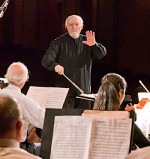Column Name
Title
Subhead
Conductor Elliot Levioff (’55, orchestral conducting) wanted to bridge an age gap in New York’s musical landscape. So a little less than two years ago, after a 40-year career as an educator and leader of community orchestras, he formed the Seniors Orchestral Society of New York, a community orchestra whose players are all 60 and older.
Body
“We wanted to make the presence of seniors an important element in the cultural fabric of the city,” Levioff, 82, told The Journal by phone recently. “We wanted people to say, look, seniors are here and seniors are accomplishing remarkable things, still, in music.”
The idea of forming a seniors-only orchestra struck Levioff after hearing that New York City is home to more than a million people over the age of 60, a number expected to increase by 50 percent over the next 10 years. “I thought that was an incredible statistic, and it occurred to me, gee, out of a million and a half I wouldn’t need that many to start a really good orchestra.”
In January of 2012, Levioff set about working to make his idea a reality, and by last October, he was conducting the 35-person orchestra’s first of four performances, at the United Palace Theater in Washington Heights. In the intervening 10 months, he and his wife Phyllis (an economist who’s the orchestra’s chief executive officer) ran ads looking for members, wrote letters, and slogged through the paperwork to achieve nonprofit status. They held auditions in their apartment, and let word-of-mouth work its magic. A friend helped them put up a Web site on which players interested in joining can review the open positions and schedule auditions.
Although the orchestra is an all-senior ensemble, soloist (and occasional substitute) slots are open to performers of all ages. Last year, Pre-College violinist Randall Goosby, a 16-year-old who studies with Itzhak Perlman (Pre-College ’63; ’68, violin), was the soloist on Wieniawski’s Second Violin Concerto. Having Goosby let “us establish a closer relationship with young people,” Levioff said. “This is obviously an orchestra for seniors as a performing group, but we want young people to come as well.”
At Juilliard, Levioff studied under Jean Morel and Pierre Monteux before moving on to get his bachelor’s in general studies from Columbia and then a doctorate in music and music education from Teacher’s College. He sees his conducting work as a logical unfolding of his passion for education. “I always enjoyed teaching,” he said. “In a sense, conductors are teachers.”
Levioff found that the relationships that formed quickly among the orchestra’s members—professionals with established careers and full lives outside of the orchestra—created a sense of camaraderie not found in all large ensembles. “It’s pushed back on the stereotype that when people are in their 60s and 70s and 80s, well, it’s time to pack it in and just sit in your rocking chair and watch television,” he said. “Here we had these marvelous, vital people who obviously didn’t fit that, and they took great sustenance from that feeling. It lasted throughout the entire year and it’s still there.”
Seniors Orchestral Society performances have tended to be in churches and old theater houses, non traditional venues that set it apart from other orchestras its size. Levioff said this orchestra is also distinct in that “we are a community orchestra that doesn’t serve a specific community—we serve all of New York City.”
For the time being, Levioff’s senior ensemble operates only in Manhattan, but the plan is to eventually expand those performances to all five boroughs and to double the number of performances each season to eight. In the meantime, though, Levioff is happy to be able to make and share music with his peers. “The fact that we’re all seniors and the fact that it’s conducted by a senior, that just provides a special bond. I don’t know how else to express it,” he said. “That we are all together, of a similar generation, working at a very high level, is enormously satisfying.”





